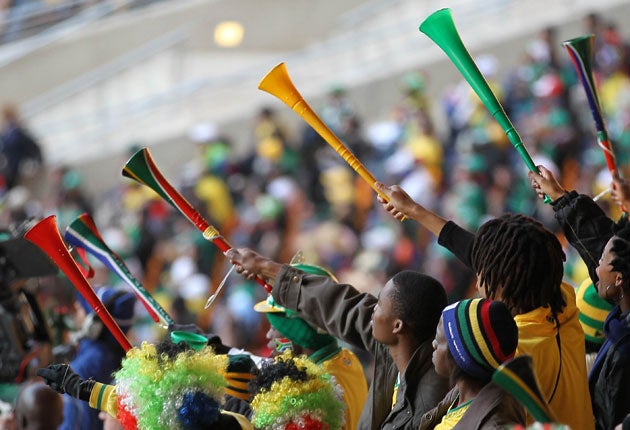Fifa found serious issues with South Africa's 2010 World Cup bid and did nothing about it, says study
Fifa was more concerned with putting on a good 'TV show' when it named South Africa as the winning bidder

Fifa identified serious issues with South Africa’s 2010 World Cup bid two weeks before choosing it as the host nation but did nothing about it, according to a new study, which also says the tournament has left the country with “an oversupply of under-utilised stadiums”.
Football’s world governing body was more concerned with putting on a good “TV show” when it named South Africa as the winning bidder, leaving the country’s taxpayers still shouldering the financial burden of the tournament years down the line, the study says.
The research, published by a British academic days before nine Fifa officials were charged with decades of corruption, appears to undermine the idea that the organisation has been a positive force in Africa – a factor that played a key part in Sepp Blatter’s re-election as president on Friday.
The report finds that only 15 days before the tournament was awarded to South Africa in 2004, Fifa officials noted that the estimated budgets put forward by the bid committee were wildly optimistic. South Africa claimed that the cost per seat of each new stadium would work out at $636 (£416) – whereas rival bidders Egypt, Libya, Morocco and Tunisia priced theirs at between $1,818 and $2,691.
“It was not possible to check how these budget estimates were reached, nor was it possible to understand fully the philosophy behind them all,” the Fifa officials wrote at the time. “We did not receive clear information explaining how the building of the prospective stadiums would be financed.”
Fifa also appeared to realise that South Africa would not raise as much money through the sale of tickets as it estimated. “In the inspection group’s opinion, the total amount of ticket sales revenue [$467,459,448] will be very difficult to reach,” they said. Ticket sales reached only $300m.
The paper, published in the journal Project Management, was produced by Professor Eamonn Molloy, who has spent 10 years studying the impact of “mega-projects” on countries that hold sports tournaments.
“There was a bit of a Field of Dreams belief which is that if you build stadiums people will come and use them – but history shows us that virtually never happens,” he said.
“Fifa was quite happy to proceed knowing that [South Africa’s] bid book proposals were way too optimistic.”
According to its accounts, Fifa made $2.35bn from the tournament, mainly from selling television rights, while South Africa spent $4.9bn – two-thirds of which was spent on building the stadiums.
Professor Molloy added that even if the immense corruption allegations levelled at Fifa were put to one side, the organisation’s business model appeared to be “profoundly flawed” and did not work in the interests of developing countries. “It invests a little bit and extracts 10 times as much – I don’t think that’s a good deal,” he said.
“Fifa’s strategy is clearly profit-maximising and exploitative. Any claims that it has a net benefit in any of the countries where it hosts the World Cup – there’s no evidence to suggest that. There’s very strong evidence to suggest it ends up costing those countries significant amounts of money.”
In South Africa, many of the stadiums left behind were “overdesigned” and contained expensive equipment which had to be maintained at taxpayers’ expense, even though some of it was never used.
Subscribe to Independent Premium to bookmark this article
Want to bookmark your favourite articles and stories to read or reference later? Start your Independent Premium subscription today.

Join our commenting forum
Join thought-provoking conversations, follow other Independent readers and see their replies